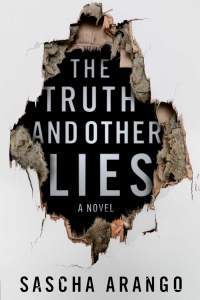The Truth and Other Lies by Sascha Arango
 Monday, July 6, 2015 at 9:24AM
Monday, July 6, 2015 at 9:24AM 
Published in Germany in 2014; published in translation by Atria Books on June 23, 2015
Henry Hayden engages in "sporadic acts of goodness" that he regards "as mere interruptions to human wickedness, and that inescapably lead to punishment." He is driven to destroy the things he loves, but only those things, and not entirely without regret. His complexity is the best thing about The Truth and Other Lies.
For the first quarter of the novel, I wasn't sure what kind of story I was reading. Then, in a pivotal and quite unexpected scene, it became clear why this is billed as a crime novel. The crime initially seems to be one of impulse but also one of mistake -- a crime gone wrong. Later, with about a quarter of the novel remaining, the story's true nature comes into focus. The Truth and Other Lies is less a crime novel and more a slow unveiling of a criminal.
But what kind of criminal is Henry? Known to the world as a bestselling author, Henry has been having a longstanding affair with Betty, his editor. Henry has kept the affair a secret from his wife, Martha, although Betty's pregnancy is making secrecy a problem. Henry has also kept a secret from Betty that is known only to Martha. Henry's trouble's mount as the story progresses but Henry tends to shape his own fate, so it isn't surprising that (as he observes late in the novel) fate is inevitably kind to him.
Henry has a secretive past in which he made an enemy, although Henry is oblivious to the enemy's existence for most of the novel. That character, like others in The Truth and Other Lies, is dangled before the reader in a tantalizing tease, then disappears as the story's focus returns to Henry. Seemingly forgotten characters return at key moments as the plot follows its carefully charted course. The mystery of Henry's past begins to play a critical role about midway through the story.
While The Truth and Other Lies is an engaging crime story, it is also a well-crafted psychological portrait of a self-centered man who suffers from a lack of empathy. Is he a psychopath or merely an opportunist? Does he have no conscience or does he simply lack impulse control? Is he detached from reality? What forces have shaped him? The police detective who hunts Henry wants to learn the truth about him but that, according to Henry, is the detective's fundamental mistake. "There's no truth in me," Henry says. "The truth has been eaten up by the fish, the truth has been burnt up in the furnace, the truth is ashes."
It is just as difficult for the reader to know Henry as it is for the detective. That isn't surprising because Henry has concealed his true self from everyone, just as Sascha Arango hides it from the reader. "We have to love Henry without knowing him" laments one of the women in Henry's life. No reader will love Henry but his complexity makes him a fascinating protagonist.
The story is good, if less interesting than Henry. It generates suspense but this isn't "edge of my seat" reading. Arango's prose is fluid, the ending is clever, and the entire novel is infused with dark wry wit.
RECOMMENDED
 TChris |
TChris |  Post a Comment |
Post a Comment |  Germany,
Germany,  Sascha Arango in
Sascha Arango in  Thriller
Thriller
Reader Comments